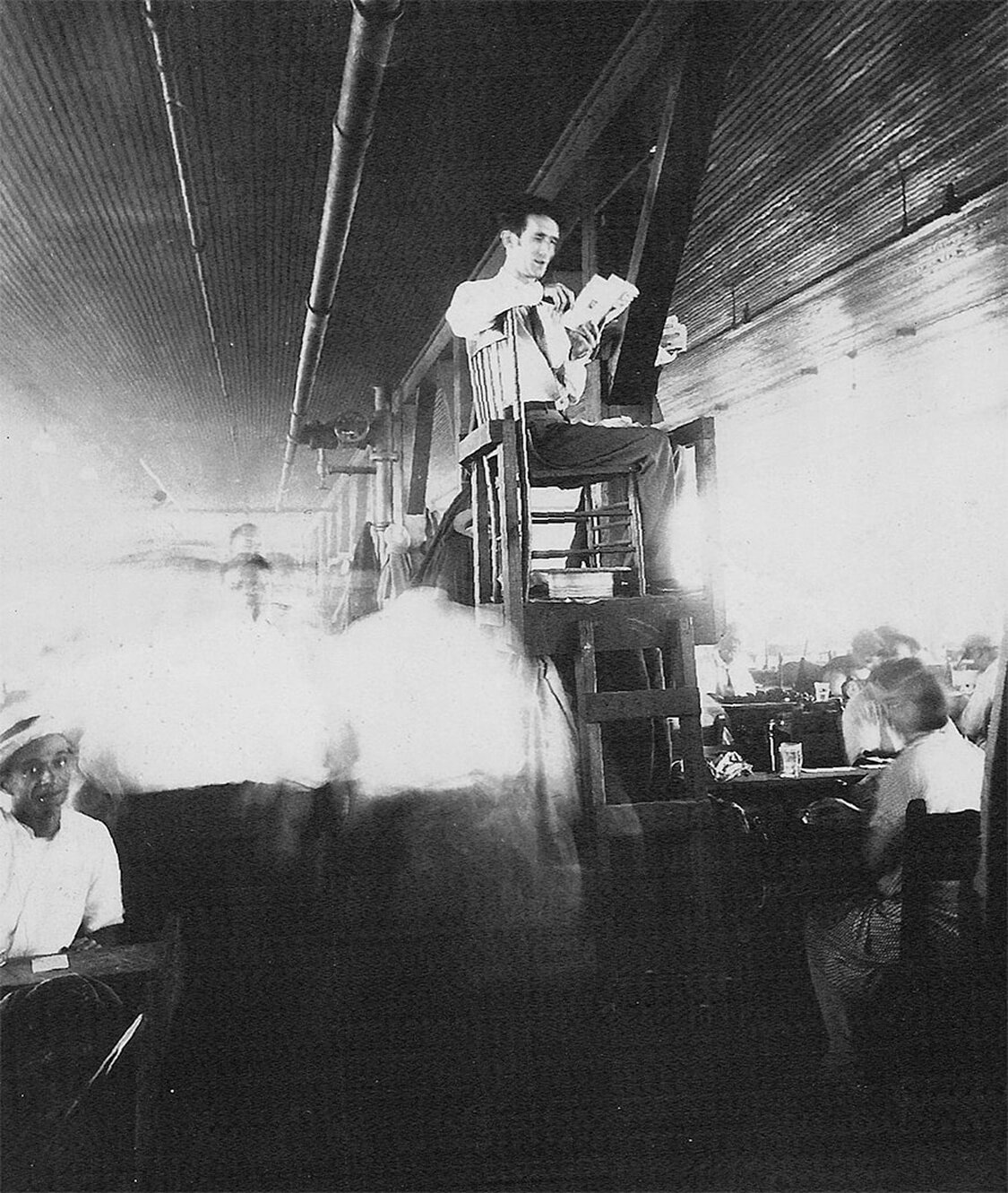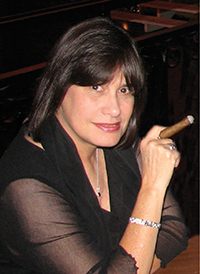|
I grabbed a rung and slowly climbed the ladder to my chair on the tribunal. With a heavy heart, I pondered how I would tell the workers what I knew. As they sat in the gallery quietly waiting for me to begin reading, I heard the sharp sound of their chavetas cutting cigars. Taking a deep breath, my lungs filled with the tobacco aroma that always permeated the air. A smell that, strangely enough, I like. Combined with the scent of the Cuban coffee the workers drink, it gives me a warm feeling and produces special memories of growing up in this cigar city. These smells and thoughts helped me momentarily escape the sad news I was about to tell the workers. While I waited for the courage to speak, some began to lift their heads–their concentration broken by the silence coming from the tribunal. Instead of taking my seat as I usually did, I remained standing. A few workers began to look at me curiously, especially since I did not have a novel in my hands. I nervously touched the back of my neck, cleared my throat, and said, "I must inform you of some very sad news." Instantly, work came to a halt as chavetas and cutters stopped; the cafetero leaning over pouring café con leche stood straight and still held the white porcelain coffee pot in his hand. All eyes were now focused on me. I cleared my throat again and began, "Early this morning, a talented El Lector, my friend and yours, Rafael Garcia Luque, climbed to the top of his tribunal at the J. Ellinger Cigar Factory and shot himself." The factory floor was filled with gasps and cries from many of the 500 workers. “Is he dead Señor Dumas? Please tell us he is not dead," cried out one woman. "He would not dothe Mafia must have made him do it!" yelled a man wearing a straw hat in the back. The noise level grew louder as they began speculating about what had occurred. I could not calm the workers as I said, "No, please let me finish everyone. It was self-inflicted." "No, it can not be. He is my cousin, and he would never do such a thing," one woman said as she ran out of the factory. Many workers stood up and yelled angrily across the room to others. "Please, everyone, sit down, sit down, and I will explain further," I pleaded. The noise attracted the attention of the foreman who had been in his office and was now standing in the back of the factory, trying to determine what had happened. One of the workers in the last row whispered the tragic news in his ear. "Please, tell us what happened," one tabaquero in the front row asked. It was difficult for them to comprehend that no one else was involved. I began to explain. As many of you know, Luque has been working at the Ellinger Factory in West Tampa for about thirteen months. This morning, soon after ascending his stand, he gave a speech to the 200 workers in the factory. He told them that his pay was insufficient to support his family and that he would rather die than keep living. With his hand shaking, he drew a 32-caliber revolver and fired it once at his head, but the ball missed and went into the ceiling. He pulled the trigger again, and the ball went into the beam over his head this time. "Aye Díos mío," one woman said as she made the sign of the cross. Another shot rang out, and that one missed as well. He grasped his wrist with his left to steady his right hand, pressed the gun's muzzle against his head just above his right ear, and fired! This time his aim was better, and he died instantly. Cries were heard from the workers before me as they listened, and others bowed their heads in prayer. "What happened next, Señor Dumas?" someone called out. I described the scene further. At the first shot, the cigar makers had rushed towards the stairway, trying to escape the dreaded scene. There was chaos. Eventually, the police and undertaker were called, and Luque's body was placed in the dead wagon. Three hundred workers formed a procession, walking behind the wagon to Luque's residence on Florida Avenue between Scott and Kay Streets. We have just learned that Luque had previously killed two men because they were teasing him about going to the war. He was also suffering from consumption, and his doctor had recently advised him he would not live much longer. That is all I know, my friends. As I finished speaking, I could see the foreman in the back of the room using his hands to form an open book and point to it, encouraging me to begin reading. I knew he was worried that if the workers were upset, today's production would be adversely affected. I began to speak loudly over the sea of voices. "I ask you, tabaqueros, to remember how Rafael Garcia Luque lived, not how he died! He was a good and honorable man." Then, speaking more softly, I read from a poem given to me by an old lector a long time ago: I climb the pulpit no more My words have been silenced forevermore. It was not my choice but my destiny And now, I must prepare for my journey. But listen carefully, and you may hear The echoes from my tribunal loud and clear. Words of hope and not despair. For life was good and more than fair. Source for historical information: Tampa Morning Tribune, September 15, 1896. Article on the death of Rafael Garcia Luque. CIGAR CITY MAGAZINE- JANUARY-FEBRUARY 2007 Art & Photography Contributors: Hillsborough County Public Library, Tampa Bay History Center, The Florida State Archives, The Tampa Tribune/Tampa Bay Times, University of South Florida Department of Special Collections, Ybor City Museum Society, private collections and/or writer. MARILYN L. FIGUEREDOMarilyn was Cigar City Magazine's co-owner and managing editor until her passing in 2007. Marilyn was born in 1948 in Tampa, where she lived her entire life and, more specifically, her early childhood in Ybor City. After a successful 30-year career at Delta Air Lines, Marilyn embarked on what became her true passion: reinvigorating the colorful, multicultural history of Ybor City through the lives and personal stories of the families and individuals who made up the uniqueness of this Tampa quarter. She did this primarily through Cigar City Magazine, serving on various committees and organizations, and attending cultural events throughout Tampa. Her work alongside her niece Lisa Figueredo, founder and Publisher, was instrumental in producing Cigar City Magazine. Marilyn's legacy will live forever throughout the pages of Tampa's first historical magazine–CigarCityMagazine FOLLOW CIGAR CITY MAGAZINE
0 Comments
Your comment will be posted after it is approved.
Leave a Reply. |
Archives
June 2013
Categories
All
|
Cigar City is a Florida trademark and cannot be used without the written permission of its owner. Please contact [email protected]
© 2021 Cigar City Magazine. ALL RIGHTS RESERVED.
© 2021 Cigar City Magazine. ALL RIGHTS RESERVED.



 RSS Feed
RSS Feed